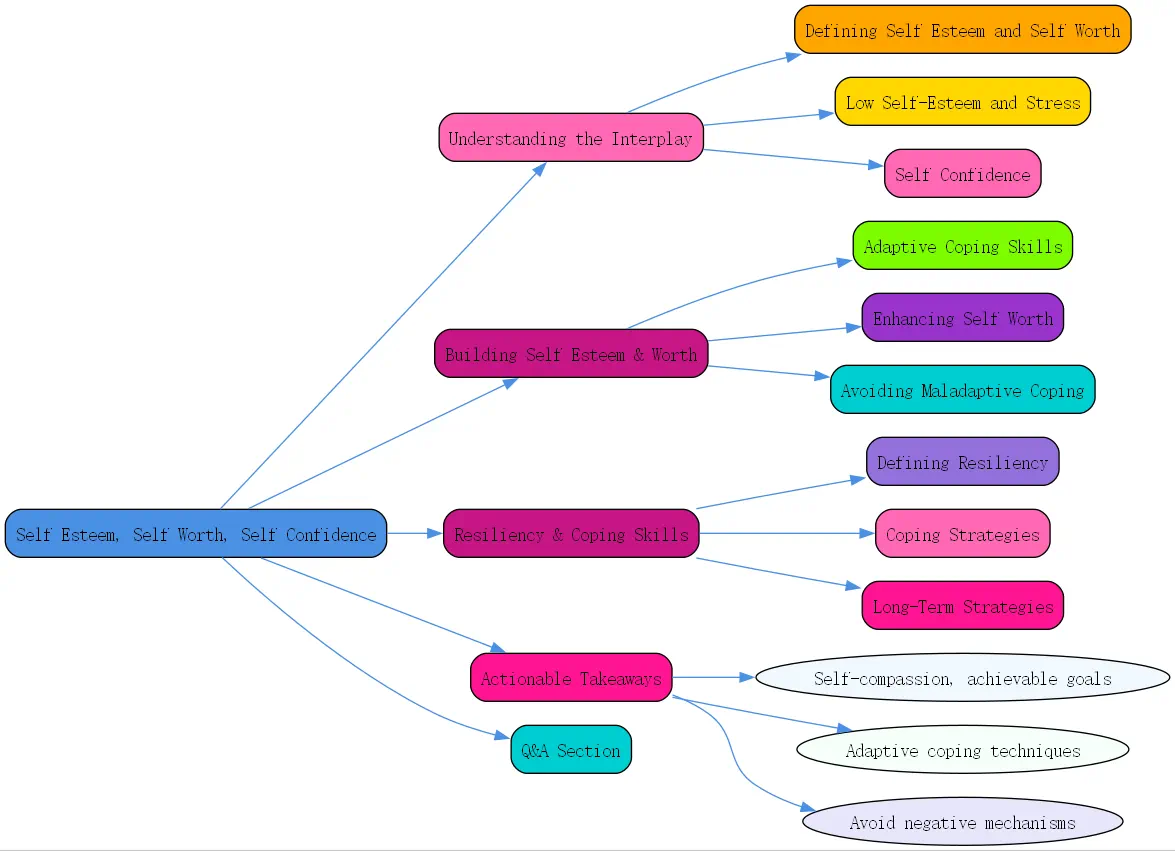Understanding the Interplay of Self Esteem, Self Worth, and Self Confidence

Self-esteem, self-worth, and self-confidence are pillars of mental and emotional well-being. Together, they empower individuals to manage life’s challenges, minimize stress, and build resilience. This article explores their differences, their interconnection with stress, and actionable strategies to nurture these qualities for a balanced and fulfilled life.
Defining Self Esteem and Self Worth
At the heart of self-improvement lies understanding self-esteem and self-worth—two closely related yet distinct concepts that shape how we perceive ourselves.
Self-esteem revolves around how we evaluate ourselves based on external achievements and validations. It can fluctuate depending on successes, failures, or the approval of others. For example, feeling accomplished after a job promotion is tied to self-esteem. However, relying overly on external factors can make it unstable.
By contrast, self-worth is intrinsic—it’s your inherent sense of value as a human being, independent of achievements or setbacks. Recognizing that you have worth simply because you exist forms a stable foundation for your emotional life. As one psychologist puts it, self-worth is the unshakeable belief that your existence matters no matter what happens around you.
Understanding these differences empowers you to build a more enduring sense of self that is less vulnerable to the shifting tides of external validation.

The Link Between Low Self-Esteem and Stress
Low self-esteem and lack of confidence often exacerbate stress responses, creating a cyclical relationship that impacts mental and physical well-being over time.
When individuals have low self-esteem, they may struggle to cope effectively with stressors. Situations such as disagreements with loved ones, workplace setbacks, or personal failures can feel overwhelming. Without the buffer of a strong sense of self-worth, people often internalize stress, leading to symptoms like irritability, difficulty concentrating, and even insomnia.
Moreover, low self-confidence can make challenges seem larger than they are, increasing the likelihood of maladaptive coping mechanisms such as withdrawal or self-criticism. Recognizing these signs early—such as changes in appetite or nagging feelings of inadequacy—is crucial to interrupting the negative loop between stress and diminished self-esteem.
Self Confidence and Its Role in Managing Stress
Self-confidence is the cornerstone of effective stress management. When you’re confident, you’re better equipped to view scenarios as opportunities rather than threats, cultivating a growth mindset.
For example, self-confidence enables people to leverage adaptive coping strategies like problem-solving or seeking social support. This psychological security shields them from emotional overwhelm and helps them tackle challenges step by step.

Additionally, when individuals possess high self-assurance, they are less likely to engage in maladaptive coping mechanisms, such as substance use or avoidance behaviors, which only exacerbate stress in the long term. Building self-confidence enables a person to focus on solutions rather than the problem, paving the way for emotional resilience when life inevitably throws curveballs.
Building Self Esteem and Self Worth: Practical Strategies
Now that we’ve established how essential self-esteem, self-worth, and self-confidence are, let’s explore actionable ways to cultivate them while simultaneously managing stress.
Adaptive Coping Skills to Boost Self Esteem
Healthy coping mechanisms can both mitigate stress and boost self-esteem. Here are some impactful strategies:
1. Exercise: Engaging in physical activity, even for 10 minutes a day, leads to improved mood and a stronger self-perception. A simple routine like walking outdoors can reduce stress hormones and enhance feelings of control and motivation.
2. Enjoyable Hobbies: Activities such as painting, playing music, or gardening encourage personal growth and self-worth by fostering creativity and relaxation. They also remind you of the joy of accomplishment without external validation.
3. Mindfulness and Journaling: Journaling promotes self-reflection and helps you identify negative self-talk patterns. Pairing this with mindfulness exercises enhances your ability to stay present, processing stress without judgment or self-criticism.
Proactive Steps for Enhancing Self Worth
In addition to coping skills, there are proactive measures that anchor self-worth over time.
- Practice Self-Compassion: Replacing self-criticism with kindness is transformative. For instance, instead of berating yourself for a failure, acknowledge the effort you made and consider what lessons the experience offered.
- Set Realistic Goals: Break larger goals into achievable steps. Celebrating small wins builds momentum and reinforces your sense of competence.
- Prioritize Relationships: Surround yourself with people who uplift and support you. Positive relationships nurture self-worth and create a safe space to cope with stress constructively.
By implementing these measures, you strengthen the internal foundation of your self-worth and build sustainable emotional resilience.
Avoiding Maladaptive Coping Mechanisms
While adaptive strategies help foster long-term well-being, it’s critical to understand and avoid maladaptive behaviors that may feel helpful in the short term but damage self-esteem over time.
For instance, substance use—including alcohol, nicotine, or prescription drugs—is a widely-used coping mechanism for stress. Unfortunately, such behaviors tend to worsen mental health and erode confidence. Substances impair judgment, increase reliance on external factors for relief, and ultimately exacerbate the stress cycle.
Instead, healthier alternatives, such as engaging in deep breathing exercises or writing down your thoughts, offer constructive solutions without detrimental consequences. Learn more about managing stress and anxiety at Can self-awareness help in managing stress and anxiety?.
The Connection Between Resiliency, Self Esteem, and Coping Skills
Resiliency plays a vital role in navigating life’s challenges while preserving self-esteem and self-worth.

Defining Resiliency and Its Relationship to Self Esteem and Self Worth
Resiliency refers to the ability to recover from difficulties and adapt to change. Individuals with robust self-esteem and self-worth tend to demonstrate greater resilience because they possess a fundamental belief in their ability to overcome challenges.
Developing resiliency is linked to cultivating adaptive coping skills, embracing failure as a learning opportunity, and maintaining a strong self-concept. This not only enhances their emotional agility but also fosters optimism in the face of adversity.
Developing Coping Strategies for Stress and Anxiety
Stress and anxiety are unavoidable, which is why it’s crucial to have diverse coping mechanisms tailored to your personal needs.
The key lies in flexibility—having coping techniques ready for various situations. For example, if exercising isn’t an option during a stressful moment, simpler skills like deep breathing or repeating a calming mantra can help alleviate immediate pressure effectively.
Tailoring coping strategies also ensures that you employ methods that feel authentic to your personality and values, further reinforcing positive self-esteem and self-worth.
Long-Term Strategies for Enhancing Self Esteem and Self Worth
Consistency in daily routines and habits leads to sustained improvements in self-esteem and self-worth.
- Healthy Sleep: Prioritize sleep hygiene by setting consistent sleep schedules and minimizing screen time before bed. Rested individuals show stronger emotional regulation and are better equipped to manage stress.
- Balanced Diet: Avoid excessive sugar and caffeine, which can amplify symptoms of stress like irritability and fatigue. Incorporating nutrient-rich foods directly supports brain function and mood stability.
- Seek Professional Help: When stress or low self-esteem becomes unmanageable, seeking support from therapists or counselors can make a dramatic difference. Organizations like BrainTalking offer expert insights and guidance on addressing mental health challenges.
Actionable Takeaways
- Cultivate intrinsic self-worth by practicing self-compassion and setting achievable goals.
- Build self-esteem with adaptive coping techniques like exercise, mindfulness, and constructive hobbies.
- Avoid maladaptive coping mechanisms such as substance use or extreme avoidance behaviors.
- Develop resiliency by embracing challenges as growth opportunities and tailoring coping strategies to your needs.
Q&A Section
Q: How can I balance improving self-esteem and managing overwhelming stress?
A: Improving self-esteem while managing stress begins with embracing small, deliberate steps. Focus first on identifying your stress triggers and signs, then incorporate accessible coping mechanisms like journaling or deep breathing. As stress diminishes, actively nurture self-worth by practicing self-compassion and pursuing enjoyable hobbies. Consistency is key; small actions compound over time to strengthen both resilience and self-belief.




